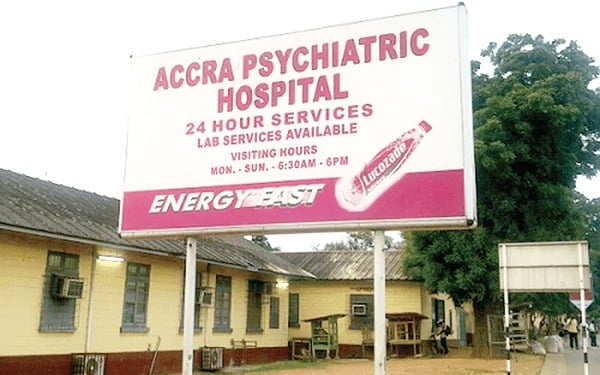Accra Psychiatric Hospital is a public mental health facility located in Accra, the capital of Ghana. It is one of three psychiatric hospitals in the country and provides mental healthcare services to patients across the southern part of Ghana. The hospital has played a central role in Ghana’s mental health system since its establishment.
History
The hospital was established in 1906 during the British colonial period, initially known as the Lunatic Asylum. It was the first facility in the country dedicated exclusively to mental health treatment. Over the decades, the hospital underwent several transformations, including changes in structure, capacity, and treatment approaches.
In post-independence Ghana, the hospital became a key institution under the Ministry of Health, providing specialized care and serving as a training center for psychiatric nurses and other mental health professionals.
Services
Accra Psychiatric Hospital offers inpatient and outpatient services for individuals with a variety of mental health conditions, including schizophrenia, bipolar disorder, and depression. It also provides emergency psychiatric care, substance abuse treatment, and counseling services. The facility has traditionally served hundreds of patients, although reports have highlighted issues with overcrowding, limited staff, and resource constraints.
Challenges
The hospital has faced several challenges over the years, including overcrowding and underfunding, which strain its infrastructure and staff; cultural stigma surrounding mental illness, which hampers public support and funding; and infrastructure decay, with parts of the facility suffering from poor maintenance and substandard living conditions.
In response, the Ghanaian government and mental health advocates called for reforms and increased investment in the mental healthcare sector.
Reforms and Advocacy
The hospital has been part of broader mental health reforms in Ghana, particularly following the passage of the Mental Health Act 2012 (Act 846). The Act aimed to decentralize mental healthcare and improve conditions in psychiatric institutions.
International organizations such as the World Health Organization (WHO) and Basic Needs Ghana have also supported mental health initiatives involving the hospital.
Psychiatrist Sheds Light on Bipolar Disorder
Dr. Ijaz Mohammed Zaman, a Resident in Psychiatry at the Accra Psychiatric Hospital, highlighted the nature of bipolar disorder and the scope of mental health services available at the facility.
He explained that bipolar disorder is one of the most common diagnoses at the hospital and is characterized by alternating episodes of mania and depression.
“During manic episodes, patients may talk excessively, need very little sleep, become impulsive or irritable, and display unusually high energy levels,” he said. “In depressive episodes, the same individuals may feel hopeless, deeply sad, and withdrawn. These are not just mood swings—they are medical conditions.”
Dr. Zaman emphasized the importance of distinguishing between general restlessness and clinical symptoms. “A person with bipolar disorder may stay awake for days, not because of insomnia, but because they feel they don’t need to sleep. That’s a clinical red flag.”
He noted that while some individuals experience mostly depressive episodes, others present with more manic symptoms, and in many cases, the condition goes undiagnosed due to limited awareness.
“We need more education, more empathy, and less stigma. Mental health is part of overall health. With the right treatment and support, recovery is possible,” he added.
Accra Psychiatric Hospital Nurse Calls for Public Involvement in Mental Health Recovery
Hillary Selassi Nutakor, a Senior Nursing Officer and Addiction Practitioner at the Accra Psychiatric Hospital, called on Ghanaians to support people undergoing recovery from mental illness and substance abuse.
Leading a tour of the hospital’s Serenity Place—a specialized unit focused on recovery—Mr. Nutakor explained the importance of providing holistic care for people in crisis.
“Recovery doesn’t end at the hospital. It’s a process that starts with detoxification and continues with rehabilitation, reintegration, and sustained support,” he said.
He warned against the damaging effects of societal stigma, saying many people avoid seeking help due to fear of being labelled.
“Mental illness and addiction are not moral failures. They are health conditions. Relapse is part of recovery, and support makes a huge difference,” he said.
Mr. Nutakor urged families, communities, and institutions to play active roles in creating an environment where people feel safe to seek help and rebuild their lives.


